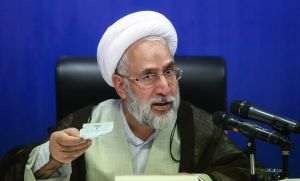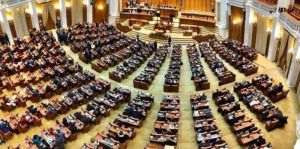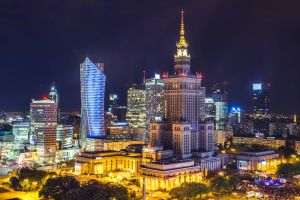The next episode in the political struggle is today"s union protests, to put pressure on the Parliament, at the time of the vote on the motion of no-confidence, by which the opposition is trying - but without the ghost of a chance - to sway a few other members of the Parliament to once again try and bring down Emil Boc"s government.
The real target of course is President Băsescu, but the odds of success have drastically decreased after Sunday, when Adriean Videanu came up with the idea that the MPs of the PD-L not come in to vote.
Even the initiators of the vote of no-confidence are convinced it that it will fail.
Paradoxically enough, the failure of the vote of no confidence will not represent a success of the government.
Quite the contrary.
Boc, Băsescu, Videanu, Ponta, Antonescu, Vîntu, Voiculescu, Patriciu and a lengthy line of personalities are in fact merely the actors cast in one of the two major screenplays, which are vying for the national audience.
We will hereinafter see how a scenario that was credible for a long time has been proven wrong; and how the other, who was initially false, becomes likely, in spite the fact that its authors are engaged in manipulation of the worst kind.
• The presidential scenario: "The impaler"
Traian Băsescu has succeeded in convincing the public that he is the hero trying to punish the crooked and corrupt "barons" living off the people"s work.
"The impaling" served as his political platform and helped him win two terms as a president.
The popularity of this scenario among his voters allowed him to justify everything, from acting and cursing like a sailor while in office, to the years of conflict with the Tăriceanu government, going as far as obstructing the actions of the government, under the pretense of eliminating the influence of Dinu Patriciu.
The people were happy to see big "noblemen" brought before the courts, and sometimes even sent to the slammer, if only for a while.
The people interpreted the hostility of the "barons" against Traian Băsescu, as a natural and fierce opposition to his attempts to clean up the country.
The early criticism of the stations of Dan Voiculescu and Sorin Ovidiu Vîntu were obviously contrived and out of line, thus having the opposite and undesired effect of increasing the president"s popularity, and enhancing the drama of his struggle with the "barons", which the president had labelled as "moguls".
The appointment of Emil Boc in the role of a dummy prime minister could be justified by the need to have an obedient prime minister to be used as a weapon in war which had escalated to such a degree that the president was forced to make a deal with the devil by entering the "monstrous coalition" which brought the Social Democratic Party (PSD) into government.
The attempt to suspend the president revealed the alliance between the "aristocracy" and the political opposition, which was made for their own interest, without any concern for the people, who responded in kind by voting to support the proposal of Traian Băsescu at the referendum.
The people were left with the impression that the president was fighting a lonely war, being isolated even within his own party, because he was fighting against the "aristocracy", which was present inside his party as well, just as it is present in politics; thus, the idea to reform the political class turned into a natural extension of the plan to cleanup the "robber barons".
This is why the people accepted even a Referendum on the reduction in the number of members of the Parliament, of which no one understood anything, except that it was what Băsescu wanted, and at the same time elected him as president for a second term (just like he got elected as mayor of Bucharest for the second time, because "he had his hands tied by the City Council which was made up of members of the PSD).
But just like it happened in the Mayoralty of Bucharest, (which Băsescu handed over to Adriean Videanu, after the citizens of Bucharest gave him what he wanted), today, when the president has a parliamentary majority and an obedient government, it becomes visible that he still can"t do anything.
Meanwhile, the crisis and the lousy management, the people"s priorities have shifted radically - wages, pensions, its own economic survival.
The people have forgotten about the "Impaler" scenario, which has been relegated by the people to the status of a show for the next theatre season.
A scenario that lost its credibility, with the chances of being played again being slim to none.
• The scenario of the opposition: "The tyrant"
The political opposition presented a scenario focused on the personality of the president, claiming that the dysfunctional relations between the major institutions of the state - the Presidency, the Government and the Parliament - are caused by the aggressive and destructive behavior of Traian Băsescu, a man who has no honor and never keeps his word, who you can expect at any time to stab you in the back, even if you were close to him, he had lured you with his friendly attitude and you were doing him a favor (a "political animal", both in terms of his instinct to win, as well as when it comes to his unscrupulousness and lust for power).
"The Tyrant" is a more appropriate title for this scenario, than "The Dictator", which is what the rather unfortunate label that the political opposition voted for (the opposition mistakenly assumed that the word would inspire terror by reminding people of Ceauşescu, but failed to take into account the huge personality difference between him and Băsescu).
The string of advisors that left him - all of good reputation - has suggested that the president completely lacks character, and he incapable of cooperating with anyone.
The long line of businessmen and politicians that passed through the courts without being indicted, has lent weight to the idea that all those actions were merely unfair harassment of the president"s personal adversaries.
The lack of concrete results of the anticorruption struggle had an interesting result: at first, the government lost its "orange" color, which implied reform; in a second stage, by perpetuating the "wicked system" beyond any tolerable limit, the supposed fight against corruption only resulted in an increase in the payout (in line with the risk), by tainting the PD-L (since it was the very beneficiary of those payouts), a PD-L whose only remaining purpose was to increase the wealth of its members.
The step from whispers about Adriean Videanu"s businesses with stone for the street curbs, to the explicit scandals involving ministers of the PD-L was taken very quickly.
The uninspired intervention of the media groups owned by the "moguls", who saturated the media with contrived and disgusting scandals (such as the case where the president called a female journalist "you filthy gipsy", or the one where the president was accused of hitting a little boy) and with obvious attempts at manipulation (which journalist Cristian Popescu accused of "lacking professionalism"), and discredited those groups, as well as the "Băsescu=Tyrant" association, which was just gaining traction.
This one of the main reasons why the population continued to back the "Impaler" scenario, and gave the "Tyrant" another term as president, even though at the time we were already feeling the effects of the crisis and the president"s agenda did not match that of the people.
The PM"s inability to manage the economic crisis became painful to the population, which, just as it has always been aware that Boc was just there to conceal the fact that Băsescu had all the power, understood that the president was to blame for the situation and for the lack of solutions.
The people feel that the harsh wage cuts are unfair and that there were other solutions; the people feels that the fruits of its labor is being wasted by an inadequate leadership and organization; citizens can see that they"re the ones paying the price for the incompetence of the leaders and the generalized corruption, and that their trust that Băsescu would eradicate these symptoms was misplaced.
The explanations for his lack of results are no longer relevant.
At any rate, Băsescu can"t come up with a credible explanation as to why the power did not do anything to make the state owned monopolies become profitable, instead of cutting wages, raising VAT and proposing pension cuts (or at the very least do the former as well as the latter).
The opposition and the moguls have now gotten the wind in their sails.
But it"s not something they should get any credit for it
• Today"s scenario: "Coup d"etat or a perpetuation of tyranny?"
The constitution identifies the coup d"etat as a change in the political regime through the use of violence.
The fact that the mass-media owned by "moguls" has synchronized its actions of manipulation with the vote of no confidence (with the goal of causing the fall of the Government), at the same time with the intensification of the unions" protests, is not enough to allow us to talk about a coup d"etat as defined by the Constitution.
Not even the suspicion that Sorin Ovidiu Vîntu orchestrated everything could be considered a "plot".
On the other hand, the reckless speech of Victor Ponta at the Congress of the PSD (calling all Romanians to take to the street on the day of the vote for the motion of no-confidence, and come before the Parliament"s building to prevent Roberta Anastase to commit vote fraud again) might sound like instigation to violence.
In other words, it suggests a coup d"etat.
The revelation of the shameless media manipulation that Sorin Ovidiu Vîntu (and most likely Dan Voiculescu) engaged in, has weakened the opposition.
The journalists that compromised themselves in this anti-presidential campaign, which spanned four years, call themselves "heroes fighting tyranny", but without any deontological justification for doing so.
The unions leaders have been compromised as well (which were fairly attacked these days, on the matter of their appropriation of the union patrimony), just like the politicians of the opposition, which are now on the defensive after the blow that the "political animal" dealt to the TV stations owned by the "mogul".
But the economic crisis is real, and so is the fact that the government led by dummy PM Emil Boc was unable to deal with its influence in an efficient manner.
While the "Impaler" scenario justified an obedient government, today the opposite is true: the passiveness and incompetence of the prime-minister become the incompetence and passiveness of the president himself, who appointed Emil Boc as PM (and did so twice, by himself and without being forced to do so by anyone, especially as, by the time they had appointed him the second time, it was obvious that he was unfit to lead during the economic crisis).
The president wasn"t smart enough to change his scenario.
He should have switched to a different scenario called "The crisis".
In any country which has a stable and longstanding democracy, there is no need for a coup d"etat to remove a government that fails to do what"s best for their voters; they just resign.
It doesn"t matter that for some, it would be hard to find someone better than Băsescu (even though there aren"t many alternatives to choose from, the former idea is certainly false); what matters is that Băsescu just isn"t up to the challenge.
On the contrary, On Sunday night, it was revealed that to prevent the vote of no-confidence from succeeding, Adriean Videanu decided that the MPs of the governing party would abstain from voting, even though they would attend the session.
It can be assumed that no member of the PDL is going to vote today - it would mean open defiance to his colleagues, with the whole country watching.
Adriean Videanu"s decision prohibits the MPs of the PD-L from following their conscience.
In the name of the party"s discipline, the freedom of conscience of the MPs of the governing party has been abolished.
The MPs elected by the people can"t exert their opinions.
Only in this case can we talk about tyranny.
And what is exactly is this tyranny trying to perpetuate?!
























































